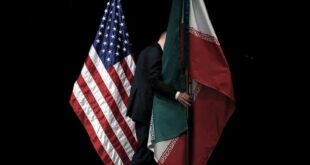VIENNA — A proposed deal to end Iran’s disputed nuclear programme highlights a new and unflattering reality facing the United States: American intercessions overseas will be seen through the prism of an Iraq war that is highly unpopular around the globe.
The Iran proposal also highlights two truths of diplomacy that endure from the days of the cold war — nuclear weapons buy nations bargaining power they would not otherwise have, and that power can only be countered with muscle from the United States.
With US forces and fortunes lashed to Iraq for years to come, nations that the United States cannot afford to alienate can insist that Washington give diplomacy every chance to succeed before resorting to economic punishment or military force, foreign policy scholars said. Even many American allies believe the Iraq war was avoidable.
“Obviously, Iraq has made a major negative impact on American credibility,” said Trita Parsi, a Middle East specialist at Johns Hopkins University School of Advanced International Studies.
Russia and China, which both opposed the Iraq war, have held off consideration of global sanctions on Iran in part out of concern that the United States had not tried every other option, Parsi said.
The US offer on Wednesday to bargain directly with Iran helped begin to dispel that suspicion.
The United States, Russia, China and three major European powers agreed Thursday on an either-or deal of incentives or punishments for Iran that would form the basis for a new round of talks involving the United States. If Iran agrees to talk, it would be the first major face-to-face diplomacy between the US and Iran in more than a quarter century.
Secretary of State Condoleezza Rice met with the foreign ministers from the European nations that led talks with Iran that stalled last year. Also present were representatives of Russia and China, which have been Tehran’s trading partners and might join in any future talks with Iran.
Since Russia and China hold vetoes in the UN Security Council, the US needs their cooperation to seek sanctions or other harsh measures by that body.
Iran would follow North Korea and Libya as the third recent example of nations whose possession or pursuit of weapons of mass destruction forced the United States to hold its nose and negotiate with tyrants whose political, economic and military might is no match for Washington’s.
“The Iraq example coupled with the North Korea example probably is part of the motivation for some in Iran to get a nuclear weapon,” and do so quickly, said Ken Pollack, research director at the Brookings Institution’s Saban Centre for Middle East Policy.
Iran absorbed the lessons of those other two nations that President George W. Bush linked as a three-way “axis of evil,” Pollack said.
“We didn’t invade North Korea because they had a nuclear weapon. We did invade Iraq because they didn’t have a nuclear weapon but we thought they were trying to get one. If you’re Iran, what is the logical lesson?”
Under heavy US pressure, North Korea agreed last year to give up its declared weapons and swear off future development. The deal is now in limbo, with North Korea refusing to return to six-way talks.
The United States said last month it would resume full diplomatic ties with Libya, a reward for leader Muammar Qadhafi’s decision three years ago to renounce weapons of mass destruction.
Both North Korea and Libya feared US military action, and used their weapons programmes as leverage to get Washington to make a deal.
The Bush administration strongly resisted calls from allies and others to negotiate with Iran. Some conservative policy-makers have repeatedly accused Iran of funding and sowing terrorism.
Rice decided about six weeks ago that the stalled European efforts to bargain with Iran were doomed unless the United States lent its weight to the effort, aides said. She drew up a timeline for US involvement that would try to resolve the impasse before the end of the year, and conditioned US involvement on suspension of uranium enrichment activities that have alarmed the West.
 Eurasia Press & News
Eurasia Press & News


